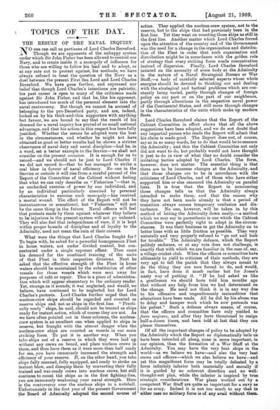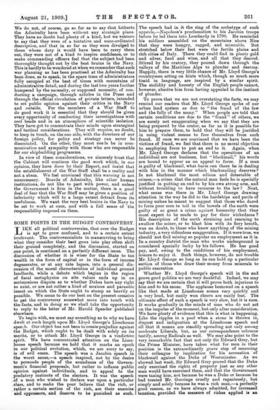TOPICS OF THE DAY.
THE RESULT OF THE NAVAL INQUIRY.
NO one can call us partisans of Lord Charles Beresford. Though we are opponents of the unhappy system under which Sir John Fisher has been allowed to control our Navy, and to create inside it a monopoly of influence for those who are willing to follow his lead and to adopt, or at any rate not to protest against, his methods, we have always refused to treat the question of the Navy as a duel between the present First Sea Lord and Lord Charles Beresford. We have gone further, and expressed our belief that though Lord Charles's intentions are patriotic, his past career is open to many of the criticisms made against Sir John Fisher, and that he, like his opponent, has introduced too much of the personal element into the naval controversy. But though we cannot be accused of belonging to the pro-Beresford party, and are, indeed, looked on by his thick-and-thin supporters with anything but favour, we are bound to say that the result of his demand for a naval inquiry has proved of no small national advantage, and that his action in this respect has been fully justified. Whether the means he adopted were the best in the circumstances, and whether he might not have obtained as good or better results had he shown a stricter observance of naval duty and naval discipline—had he, in a word, set a better example to the Service—we shall not consider on the present occasion. It is enough for us to record—and we should not be just to Lord Charles if we did not record it—that he has managed to strike a real blow in favour of naval efficiency. No one in the Service or outside it will rise from a careful perusal of the Report of the Committee of the Cabinet without feeling that what we can only describe as " Fisherism "—that is, an unchecked exercise of power by one individual, and by an individual particularly unsuited by personal characteristics to exercise such monopoly—has received a mortal wound. The effect of the Report will not be instantaneous or sensational, but " Fisherism " will not be the same thing in the future. Naval officers will feel that protests made by them against whatever they believe to be injurious in the present system will not go unheard. They will also feel that independence of view, if it is kept within proper bounds of discipline and of loyalty to the Admiralty, need not mean the ruin of their careers.
What were the things that Lord Charles fought for ? To begin with, he asked for a powerful homogeneous Fleet in home waters, not under divided control, but con- centrated under a single supreme officer. Then came his demand for the combined training of the units of that Fleet in their respective divisions. Next he asked that the effective strength of the Fleet in home waters should be maintained by the substitution of other vessels for those vessels which were sent away for purposes of refit or repair. This is a piece of administra- tion which will appear elementary to the ordinary reader. Yet, strange as it sounds, it was neglected, and would, we believe, have continued to be neglected but for Lord Charles's protests. Lord Charles further urged that the nucleus-crew ships should be regarded and counted as reserve ships and not as ships in the first line. "Practi- cally ready ships, he said, should not be treated as ships ready for instant action, which of course they are not. As we have often pointed out in these columns, the nucleus- crew system is an excellent one when applied to ships in reserve, but fraught with the utmost danger when the nucleus-crew ships are counted as vessels in our main striking force. To put it in another way. When you take ships out of a reserve in which they were laid up without any crews on board, and place nucleus crews in them, and thus have them as it were more than half ready for sea, you have immensely increased the strength and efficiency of your reserve. If, on the other hand, you take ships fully manned, fully equipped, and ready to strike an instant blow, and disequip them by converting their fully trained and war-ready crews into nucleus crews, but still continue to count the ships as in the first fighting-line, ;you are immensely weakening your naval strength. Hero is the controversy over the nucleus ships in a nutshell. Unfortunately in the first year of the present Government the Board of Admiralty adopted the second course of • action. They applied the nucleus-crew system, not to the reserve, but to the ships that bad previously been in the first line. Yet they went on counting those ships as still in the first line. Another matter which Lord Charles forced upon the attention of the country and of the Government was the need for a change in the organisation and distribu- tion of the Fleet in order that such organisation and distribution might'be in accordance with the golden rule of strategy that every striking force needs concentration instead of dispersion. Finally, Lord Charles Beresford insisted on the necessity of some body at the Adniiralty in the nature of a Naval Strategical Bureau or War Staff,—a body of carefully selected experts whose whole energies should be devoted to thinking out and dealing with the strategical and tactical problems which are con- stantly being varied, partly through changes of foreign policy on our part or on the part of our neighbours, partly through alterations in the respective naval power of the Continental States, and still more through changes in the characteristics of the units which make up modern fleets.
Lord Charles Beresford claims that the Report of the Cabinet Committee in effect shows that all the above suggestions have been adopted, and we do not doubt that any impartial person who reads the Report will admit that his claim is made good. The Report does not, of course, say so in so many words, for to do that would be to censure the Admiralty ; and this the Cabinet Committee not only did not want to do, but probably would not have thought it just to do in view of what they no doubt consider the irritating tactics adopted by Lord Charles. The form, however, does not matter. The essential thing is that there are to be immense changes at the Admiralty, and that those changes are to be in accordance with the criticisms of Lord Charles, and of those who have either supported him or else censured the Admiralty on parallel lines. It is true that the Report in announcing those changes tells us that the Admiralty always intended to make them, and that the reason why they have not been made already is that a period of transition always causes temporary confusion and dis- turbance. No one, however, will be taken in by this method of letting the Admiralty down easily,—a method which we may say in parenthesis is one which the Cabinet Committee were perfectly right to adopt in the circum- stances. It was their business to get the Admiralty on to better lines with as little friction as possible. They very naturally and very properly refused to "go out and look for trouble." The Admiralty defence, which the Report politely endorses, or at any rate does not challenge, is exactly that with which we are familiar in the case of, say, a village cricket club. When the officers or committee have ultimately to yield to criticism of their methods, they are very apt to tell the parish that they always meant to do the thing they are now forced to do, and would, in fact, have done it much earlier but for Jones's nasty way of putting it. "If he bad asked ' us like a, gentleman we should have told him months ago that without any help from him we had determined on the change. He need not think it is in any way due to his offensive and ungentlemanly insinuations that alterations have been made. All he did by his abuse was to delay and hamper work which he now pretends was his patent." Such a defence always means, of course, that the officers and committee have only yielded to force majeure, and after they have threatened to resign half-a-dozen times, and been told at last that they can please themselves.
Of all the important changes of policy to be adopted by the Admiralty which the Report so diplomatically tells us have been intended all along, none is more important, in our opinion, than the formation of a War Staff at the Admiralty. You may have the very best ships in the world—as we believe we have—and also the very best crews and officers—which we also believe we have—and yet this magnificent force may be totally defeated by a. force infinitely inferior both materially and morally if it is guided by no coherent direction and no well- thought-out plan, while the inferior is inspired by true strategic considerations. War plans worked out by a competent War Staff are quite as important for a navy as for an army. Indeed it is not too much to say that in either case no military force is of any avail without them.
We do not, of course, go so far as to say that hitherto the Admiralty have been without any strategic plans. They have no doubt had plenty of a kind, but we venture to say that they were of a tentative and unco-ordinated description, and that in so far as they were divulged to those whose duty it would have been to carry them out, they were not of a kind to inspire confidence, or to make commanding officers feel that the subject had been thoroughly thought out by the best brains in the Navy. This is hardly to be wondered at when we remember that such war planning as has been practised at the Admiralty has been done, so to speak, in the spare time of administrators fully occupied at the best of times with mountains of administrative detail, and during the last two years further hampered by the necessity, or supposed necessity, of con- ducting a campaign, through articles in the Press and through the official circulation of private letters, intended to set public opinion against their critics in the Navy and outside. For the members of a War Staff to do good work it is essential that they should be given every opportunity of conducting their investigations with cool heads and in an atmosphere of scientific isolation. They have got to concentrate their minds upon strategical and tactical considerations. They will require, no doubt, to keep in touch, on the one side, with the directors of our foreign policy, for policy and strategy can never be dissociated. On the other, they must neels be in com- munication and sympathy with those who are responsible for our shipbuilding programme.
In view of these considerations, we sincerely trust that the Cabinet will continue the good work which, in our opinion, they have done by their Report, and insist that the establishment of the War Staff shall be a reality and not a sham. TEre feel convinced that this warning is not unnecessary. Boards of Admiralty, like other human institutions, do not like to part with power, and unless the Government is firm in the matter, there is a good deal of fear that the War Staff may be given a position of inferiority which will to a large extent detract from its usefulness. We want the very best brains in the Navy to be set to work at once, and with a full sense of the responsibility imposed on them.







































 Previous page
Previous page